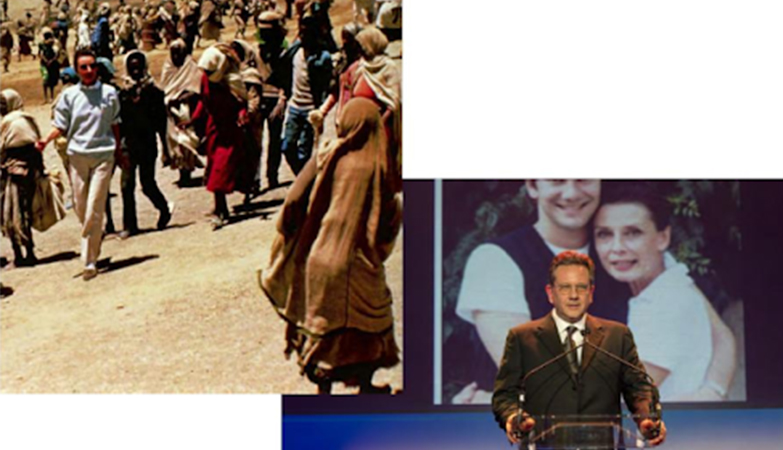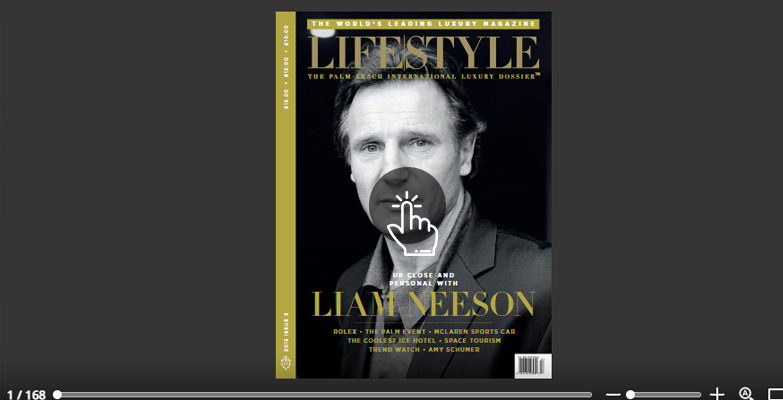HONORING THE LEGACY OF AUDREY HEPBURN
Actress Audrey Hepburn died of a rare type of cancer, but it was the way she lived her life that inspired her son Sean Hepburn Ferrer,
to write two books and become an advocate for all people with rare diseases.
BY ROXANNA CELLA

MY MOTHER BELIEVED strongly that every life matters, Sean Hepburn says.
She demonstrated on a daily basis. particularly through her humanitarian work as a Goodwill Ambassador for UNICEF, her strong belief in the value of every life, he says.
As a result, Ferrer is now an advocate for the National Organization for Rare Disorders (NORD) and its sister organiza tion in Europe, EURORDIS. He is donat- ing proceeds from a children’s book he has written to NORD and EURORDIS, He serves as the international ambassador for rare disease day.
Sean Hepburn Ferrer, and the Director of Membership for NORD, Lisa Phelps, Sat down to talk about the first international Rare Disease day.
JUST REAL QUICK I WANTED TO TELL YOU THAT ONE OF MY FAVORITE PAINTINGS IN MY OFFICE IS A PORTRAIT OF YOUR MOTHER, AUDREY.
Sean Hepburn
– Awe, that’s wonderful!
WE LOVE HER. WE MISS HER DEARLY AND IT'S JUST SUCH A PLEASURE TO HAVE YOU HERE TO TALK WITH US ABOUT SUCH AN IMPORTANT, BUT OFTEN OVERLOOKED ISSUE, RARE DISEASES.
Sean Hepburn
– Awe, that’s I know, and yet they are phenomenal. When you put all the numbers together
– 60 million worldwide and 30 million in America-those are some serious numbers to reckon with.
IT TRULY IS. AND THIS ISSUE CLEARLY HITS HOME. WHEN DID YOU REALIZE YOUR MOTHER WAS STRUGGLING WITH A RARE DISEASE?
Sean Hepburn
– It took a while to get the first diagnosis. We thought she had caught a bug on
one of those trips to Africa for UNICEF. Then she did an endoscopic procedure, but the primary was in the appendix-which is too sharp a corner for the cameras Finally, when they operated on her, they discovered that she had PMP or pseudomyxoma peritonei. At the time it was called adenocarcinoma.
PMP is a form of rare cancer that doesn’t develop a tumor, but sort of sprinkles the stomach and intestinal cavities. And I have to tell you: we felt a crushing sense of loneliness, a lack of options, and a lack of treatments. But I’m glad to announce that this is now a thing of the past. Not only has medical research come a long way, but the amount of options and treatments are way up. Survival rates are way up and remissions are a reality. That sense of loneliness that we felt, thanks to the work of NORD (National Organization of Rare Disease) and its European counterpart, that feeling has really become a thing of the past.
IT TRULY IS. AND THIS ISSUE CLEARLY HITS HOME. WHEN DID YOU REALIZE YOUR MOTHER WAS STRUGGLING WITH A RARE DISEASE?
Sean Hepburn
– Well one of the things I’ve discovered over the last two years is that science and technology are starting to treat regular conditions like they treat rare diseases, So What I believe is going to happen is what we are learning today through the treatment of rare diseases are something that is going to be transposed and utilized in the treatment of regular conditions.

“WE FELT A CRUSHING SENSE OF LONELINESS, A LACK OF OPTIONS, AND A LACK OF TREATMENTS.”
THE DOCUMENTARY, OUR CURSE, RECEIVED AN OSCAR NOMINATION, WHICH IS REALLY A WONDERFUL THING TO HELP BRING MORE ATTENTION TO THIS.
Lisa Phelps
– Yeah, the nomination for an Oscar was wonderful for this community because with 7000 rare diseases, the lack of attention and awareness for them is so critical. It’s a great film, made by a great family and we’re very happy for them.
THAT'S GREAT! SEAN, YOU HAVE ALSO WRITTEN A BOOK.
Sean Hepburn
– I did. I started writing before I was asked to be an ambassador. It’s a book
that celebrates the life of a dear friend by the name of Mauricio Saravia. He suffered from a condition called McCune-Albright (syndrome), and yet he lived a fulfilling and complete life, both as an individual and as an artist. The book is called, “Mauricio of Uruguay.” It’s available at Lulu.com. All of the proceeds go to NORD and its European counterpart.
What better way to acquire a children’s book, which teaches you about courage and lightness of heart, to sort of start to think in the right terms about what it means to have a rare disease or any disease at all.
LISA, LET'S HOPE THAT SEAN HAS PLANS OF MAKING A FILM OUT OF THIS.
Lisa Phelps
– Well, we are very thankful for Sean’s support of the rare disease community. It’s incredible to have people like him as ambassadors for the 30 million Americans and 60 million worldwide.
NOW LET'S TALK ABOUT THE FIRST INTERNATIONAL RARE DISEASE DAY.
Lisa Phelps
– Yes, It’s a great day that unites the 30 million Americans in the community to help raise awareness and spread the message of the needs and challenges that are faced by patients of rare diseases. To learn more about that day you can go to RareDis easeDay.us.
SEAN WANTS TO use this opportunity to remind patients and their caregivers that they are not alone, to empower them as patient advocates and make them aware of resources available through NORD.


